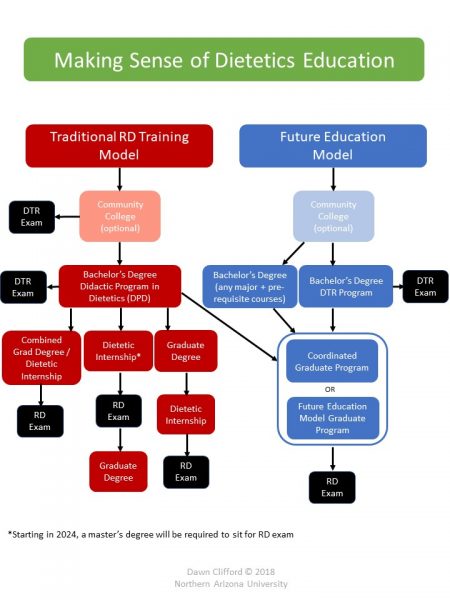Bachelor of Science in Health Sciences : Nutrition and Foods with NDTR-making sense of dietetic education
College course work
The associate degree course work for dietetic technicians includes a variety of classes in food and nutrition sciences, foodservice systems management and a range of general science courses.
Employment opportunities
NDTRs work independently as team members under the supervision of registered dietitians in a variety of employment settings, including healthcare, business and industry, community/public health, foodservice and research. Many work environments require credentialed NDTRs.
NDTRs work in:
- Hospitals, clinics, nursing homes, retirement centers, hospices, home health-care programs and research facilities conducting patient/client screens, gathering data and performing other tasks to assist the registered dietitian in providing medical nutrition therapy.
- Schools, day-care centers, correctional facilities, restaurants, health-care facilities, corporations and hospitals, managing employees, purchasing and food preparation and maintaining budgets within foodservice operations.
- Women, Infants, Children (WIC) programs, public health agencies, Meals on Wheels and community health programs, assisting registered dietitians with the implementation of programs and presentation of classes for the public.
- Health clubs, weight management clinics and community wellness centers, helping to educate clients about the connection between food, fitness and health.
- Food companies, contract food management companies or food vending and distributing operations developing menus and overseeing food service sanitation and food safety.
More information about NDTR
Dietetic technicians, registered (NDTRs), trained in food and nutrition, are an integral part of the health-care and food service management teams.
NDTRs must meet the following criteria to earn the NDTR credential:
- Completed a dietetic technician program accredited by the Accreditation Council for Education in Nutrition and Dietetics (ACEND) of the Academy of Nutrition and Dietetics, that includes 350 hours of supervised practice experience in various community programs, healthcare and foodservice facilities and has completed at least a two-year associate’s degree at a U.S. regionally accredited college or university.
OR Completed an ACEND accredited didactic program or coordinated program in dietetics and has completed at least a bachelor’s degree at a U.S. regionally accredited college or university or foreign equivalent.
- After completing the degree and dietetics coursework, passing a national examination administered by the Commission on Dietetic Registration (CDR). For more information regarding the examination, refer to CDR’s website at www.cdrnet.org . In order to maintain the credential, a NDTR must complete continuing professional educational requirements.